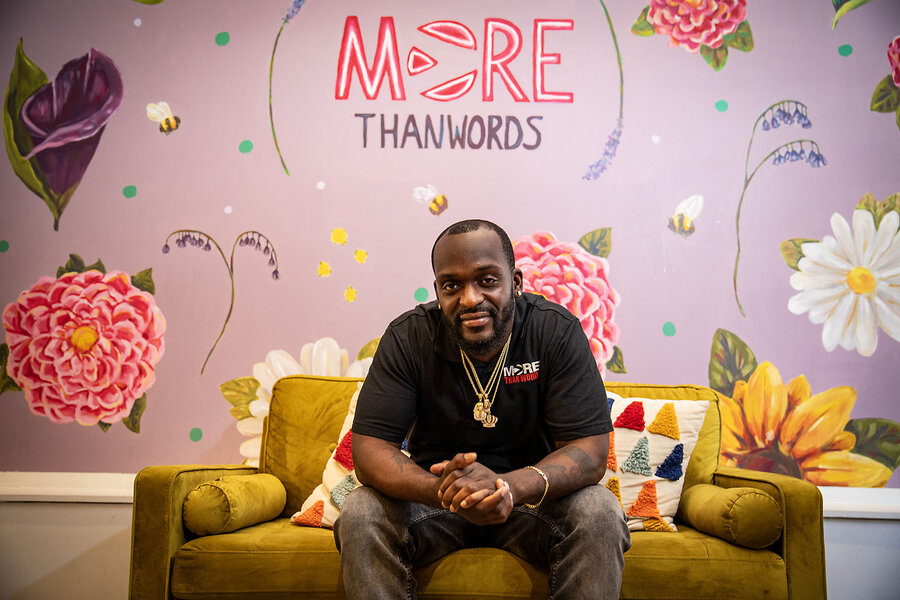Now Reading: ‘A sense of belonging.’ How this Boston bookstore changes lives.
-
01
‘A sense of belonging.’ How this Boston bookstore changes lives.
‘A sense of belonging.’ How this Boston bookstore changes lives.

Jarris Charley says he didn’t believe in jobs when he was growing up on the line between Boston’s Roxbury and Dorchester neighborhoods.
The people he knew who had legitimate jobs, including his mom, didn’t find much success. Everyone in his community lived check-to-check and paid rent. The drug dealers were the ones with money.
“So I was invested in the streets: drugs, guns, robberies. That’s just what I was caught up into at a young age,” he says.
Why We Wrote This
A story focused on
More Than Words is a bookstore, but one that does more than sell $3.8 million worth of merchandise a year. It serves young people who are dealing with homelessness or legal challenges and gives them a place where they belong.
He ended up in juvenile detention at age 15, and in prison for robbery at 23.
Near the end of a five-year prison term, a second chance arrived. An old manager from a job-training program called More Than Words visited, and asked him, “Jarris, why don’t you just come back?”
More Than Words is a bookstore, but one that does much more than sell bestsellers. The program serves young people ages 16 to 24 who face the highest barriers to building stable lives. Participants face homelessness, are in the foster care system, are out of school, or are involved in the legal system. It gives them job skills, but graduates like Mr. Charley say that the sense of belonging and acceptance – that they matter – is the most valuable thing they take from the program.
“I like to say we’re in the mattering business,” says founder Jodi Rosenbaum.

Melanie Stetson Freeman/Staff
More Than Words uses 100% of its proceeds for training and educating young people ages 16 to 24 – helping them learn professional skills and goal setting.
More Than Words’ support goes beyond job training. There’s a paid “on-ramp” of six to 12 weeks in which the program helps with everything from housing and food costs to making sure participants have suitable work attire. Youth development managers offer support in a range of areas, including future employment, housing, transportation, financial planning, and navigating the legal system. After graduation, young people can access career services and bridge funding for tuition, rent, and child care so they can further their education and training.
“None of this works if that all doesn’t hang together, right? Like a job training program means nothing if you don’t know where you’re sleeping at night or if you have court the next day, and you don’t have people helping you plan and figure that out,” says Ms. Rosenbaum.
More Than Words has grown significantly in its two decades of existence. It started with a 150-square-foot office space where young people sold donated books online. Today, it operates three storefronts in the Boston area. It served around 318 young people last year, who sorted about 4.5 million donated books and earned over $3.8 million in net revenue.
Almost all More Than Words graduates go on to earn a high school diploma or equivalent degree, according to the organization’s data. In general, about 60% of foster youth and 66% of homeless students living in Massachusetts graduate within four years.
“A lot of people feel that they don’t have a lot going for them or they don’t have a lot of potential,” says Mr. Charley. “We speak life into them.”
That was the case for him.
For the past three years, he’s been mentoring young people at More Than Words. He works in career services, helping young people in the area that tripped him up the most: getting that first good job after graduating from the program.

Melanie Stetson Freeman/Staff
Jarris Charley kept the paper he wrote aspirational words on when he joined the More Than Words program as a teenager. He wrote: “To better myself and establish what it is I want in life.”
“He was the first white man I trusted”
Ms. Rosenbaum founded More Than Words in 2004. She had worked as a public school teacher and for the child welfare system, and became disenchanted with government systems.
She saw the same young people appear in court for being abused later being charged with delinquency. It didn’t make much sense to her.
“All these young people who literally were deemed by the state as victims of abuse and neglect, in need of protection from the state – and they were the ones who were literally fast-tracked into the justice system,” she says.
Ms. Rosenbaum found that the process of selling a book online had therapeutic value. It has clear steps leading toward a positive outcome: Pick up the book from where it was donated, find out how much it’s worth, package the book, ship it, and then watch money come in.
“It was so grounding and organizing for them in their otherwise fairly chaotic lives,” she says.
Young people are involved in every aspect of the business, from working the register, to designing the interior, to building financial models. The mural on More Than Words’ Boston location is the handiwork of one past participant.
More Than Words Boston, where Mr. Charley works, is located on a street just off Interstate 93 in a postindustrial part of South Boston. Dust and exhaust fill the air outside the store, located in a former factory building, on a sunny afternoon in May. Inside, it’s tidy and spacious. In the front, wooden tables carry rattan cross-body bags and socks with giraffes and penguins. All the merchandise is made by businesses that address social issues as part of their mission.

Melanie Stetson Freeman/Staff
Jarris Charley stands among the shelves where More Than Words keeps the books it sells online and in-person, May 13, 2025.
Mr. Charley got his start building shelves in the store in 2012.
He had attended Lexington Minuteman High School. He says there were limited spots at the vocational high school for people from his part of the city.
Mr. Charley says he’s grateful for the experience, but felt like he was only appreciated for his athletic prowess. When people greeted him in the hallways, he felt like, “You’re saying ‘What up?’ to me because I’m the quarterback. You’re not saying ‘What up?’ to Jarris.”
“You don’t think a Black person sees that?” he adds.
He left school near the end of his sophomore year after an event involving his cousin, he says. Arrest and juvenile detention followed. Then he found his way to More Than Words.
“He was the first white man I trusted,” says Mr. Charley about one of his managers. He always asked when he didn’t understand part of Mr. Charley’s experience – instead of just spouting advice.
“How are you going to tell me how to deal with my best friend being shot in the head if you ain’t had a best friend that’s been shot in the head,” he says, his voice wavering, then sharpening with anger. “Don’t tell me how to deal with it.”
One of Mr. Charley’s goals is to help his mentees understand their behavior and, ultimately, figure out how to stop doing things that get them into trouble.
“A sense of belonging”
Back when Chris Anderson joined More Than Words, around 2005, he worked directly with Ms. Rosenbaum. He was at a group home in Watertown when he first encountered her.
“Jodi just kind of walked in one time and we’re all sitting in the living room and she kind of just stood up and said, ‘Does anybody want a job?’” he says.
He found “a sense of belonging” while helping Ms. Rosenbaum start her business. Participants were stubborn, got in trouble at school, and didn’t do what they were supposed to do. “No matter what, she just kept trying to realign you to get onto that path,” he says.

Melanie Stetson Freeman/Staff
Chris Anderson, who was invited to join the More Than Words program two decades ago, now lives in Marlborough, Massachusetts.
He first encountered the state in kindergarten, when he threw milk in his teacher’s face. An officer recommended what was then called CHINS, or Child in Need of Services. Next, the Massachusetts Department of Children and Families investigated his mother for neglect, he says. In a later email, he adds that he believes his mother did the best she could.
In middle and high school, Mr. Anderson says he got into fights, provoked police officers, and constantly skipped class.
He eventually ended up living in residential facilities and, later, group homes.
While acknowledging some caseworkers were helpful, though overworked, the state systems he was involved with felt “transactional,” he says. He had a few therapists through the Department of Children and Families, but his short stint with each of them prevented the experience from feeling valuable. “‘Here’s another one for you.’ ‘Sorry, I’m leaving.’ ‘Here’s another one for you.’ And that right there, like, ruins it,” he says.
No one stuck around for long. Until Ms. Rosenbaum.
Today, Mr. Anderson, now in his 30s, is a chief operations officer for a technology company, a father, and sits on the board of More Than Words. And he’s still close with Ms. Rosenbaum, asking for advice about his relationship with his own children.
“How you feeling today?”
Near the entrance to the back room where young people sort books in large bins, posters with goals line the top of a wall near the entrance.
“What’s up?” Mr. Charley says warmly to one young person.
“Why are you looking [at me]?” she asks, giggling.
“Because you’re smiling at me. I’m just seeing what’s up with you,” he says, matching her tone. “How you feeling today?”
Mr. Charley still lives where he grew up, in Grove Hall, which he says everyone who finds a good job leaves. He stayed.
Editor’s note: This article, originally published June 2, has been updated to correct Chris Anderson’s age. It has been updated to clarify his relationship with his mother and his position with More Than Words.






















